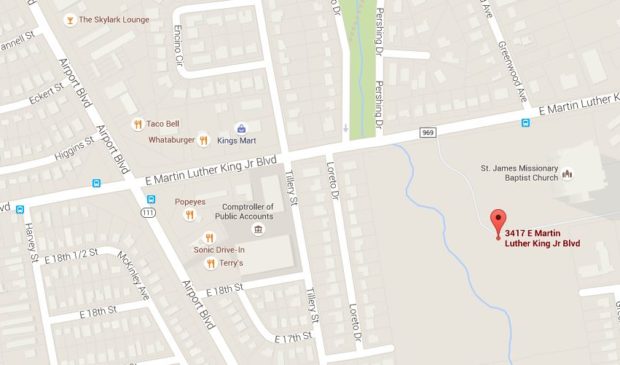East Austin neighborhood fights church over redevelopment plan
Friday, August 19, 2016 by
Cate Malek It was meant to be a practical plan for a local church to get out of debt. But when St. James Missionary Baptist Church requested that part of its property be rezoned in order to build new condominiums, it tapped a nerve in rapidly gentrifying East Austin.
Members of a historically African-American neighborhood near the intersection of Martin Luther King Jr. Boulevard and E.M. Franklin Avenue aired their concerns about the new condominiums at last week’s City Council meeting. Although they had to wait until past 10 p.m. to speak, almost a dozen members of the community said they feared the condos would irreversibly damage the community where they had lived for decades.
Council deferred making a final zoning decision until late September.
“I do want to wish St. James Baptist church the very best, and the best of prosperity and success in all their endeavors, but not at the expense of my neighborhood,” said community member Josephine Williams.
Like many of the speakers, Williams said she was a long-term resident of the neighborhood. She has lived on Loretta Drive for almost 50 years. “I have a lot of emotional attachment for my neighborhood,” she said. “We’ve tried very hard to keep this a very pleasant and safe neighborhood because we’ve raised a lot of children on that street.”
St. James has also been in the neighborhood for decades. The church was founded in 1927, and the first building in its current location was built in 1969, according to Laura Toups of Urban Design Group. The church is looking to rezone part of its property in order to allow Urban Design Group to redevelop the site. Selling part of the property would allow the church to pay off its debt, which would help the church continue its mission, Toups said.
Although residents of the neighborhood said they fully supported the church and its efforts to be financially responsible, they also said they believe the redevelopment will cause traffic jams on their narrow residential streets, lead to increased flooding and, most importantly, change the character of the neighborhood.
“This is one of Austin’s few and lasting historic African-American neighborhoods,” said Andrew Bucknall, a representative of the Martin Luther King Neighborhood Organization. “The people who move into condos are not the same people that move into single-family houses. What we often see in condos, whether it’s allowed or not, is short-term rentals. And those aren’t people who live in the neighborhood, not people that participate in the neighborhood association. They aren’t people who carry on the tradition of that neighborhood.”
The residents were also concerned that the development could disrupt an old slave graveyard that is on the land as well as lead to the demolition of a number of heritage oak trees.
But church leaders said they have no intention of damaging the neighborhood. “We have been at this location since 1969,” said Billy McClendon, senior pastor at St. James. “So we are still committed to being good neighbors. Whatever we can do to minimize the impact of this development on this community, we are committed to doing just that.”
He said the church knows that there is “nothing that (they) can etch in stone to make any developer do anything” but that they are committed to protecting the area and to minimizing traffic problems and any environmental concerns.
After hearing more than an hour of testimony, Council Member Ora Houston asked for a postponement, which Council unanimously approved with Council Member Ellen Troxclair absent.
“I know everybody’s heart is in the right place,” said Houston, in whose District 1 the church is located. “And I know everybody in the neighborhood knows that (the church has) a right to sell (its) property. What we want to do is make as little impact on the surrounding neighborhood as we can.”
The Austin Monitor’s work is made possible by donations from the community. Though our reporting covers donors from time to time, we are careful to keep business and editorial efforts separate while maintaining transparency. A complete list of donors is available here, and our code of ethics is explained here.
You're a community leader
And we’re honored you look to us for serious, in-depth news. You know a strong community needs local and dedicated watchdog reporting. We’re here for you and that won’t change. Now will you take the powerful next step and support our nonprofit news organization?









